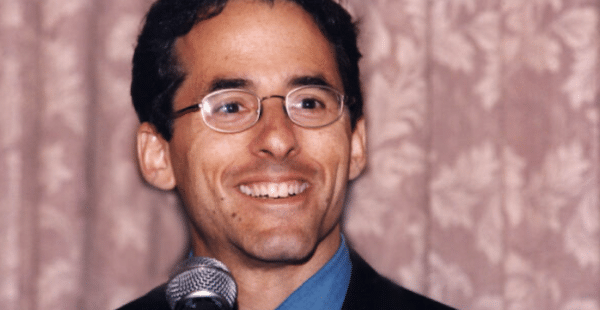Janine Jackson interviewed CEPR’s Mark Weisbrot about Argentine President-elect Javier Milei for the November 24, 2023, episode of CounterSpin. This is a lightly edited transcript.
Janine Jackson: Many people are hearing the name Javier Milei for the first time about now. Milei has just been elected president of Argentina—56% to 44% are the numbers we’re hearing right now—over the country’s economic minister, Sergio Massa.
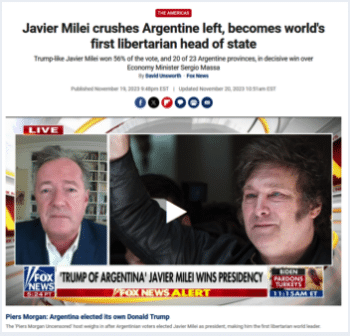
Fox News (11/19/23)
Fox News trumpeted, “Javier Milei crushes Argentine Left, Becomes World’s First Libertarian Head of State.” Donald Trump announced that Milei would “truly make Argentina great again,” and Elon Musk declared, “Prosperity is ahead for Argentina.” That reception gives you some indication of where this is going, and what it could mean.
Mark Weisbrot is co-director of the Center for Economic and Policy Research in Washington, DC. He’s author of the book Failed: What the “Experts” Got Wrong About the Global Economy, and co-author, with Dean Baker, of Social Security: The Phony Crisis. He joins us now by phone. Welcome back to CounterSpin, Mark Weisbrot.
Mark Weisbrot: Thanks, Janine. Great to be here.
JJ: Lest there be a lot of mystery: To start with, Javier Milei carried around a chainsaw as a prop on the campaign trail, and that was about “cutting public spending.” And he described the state as a “pedophile in a kindergarten.” And don’t think he’s done, because he went on to say “the state is a pedophile in a kindergarten with the children chained up and bathed in Vaseline.”
It reminds me of Duterte saying he’d be “happy to slaughter” 3 million drug addicts in the Philippines, and of course it reminds folks of Trump and his current pledge to “root out the Communists, Marxists, fascists and the radical-left thugs that live like vermin within the confines of this country” (and that’s just from this week).
It’s histrionic. We have politicians saying things you hear supervillains in the movies say. And I guess the concern is that they will be underestimated as merely colorful and over the top, and not considered in terms of the actual real-world things that they want to do and are capable of.
So there, that’s my setup. What are the material things that listeners need to know about Javier Milei and his election?
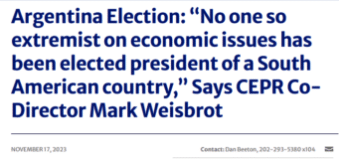
CEPR (11/17/23)
MW: Well, the material craziness of Milei is an important part of the story. And as you mentioned, or hinted at, by the examples you gave, the media have been comparing him to Trump, and he likes it. And so it is part of that phenomenon, which we could talk about for hours, of crazy people getting elected in situations and ways in which they wouldn’t in the past. And, of course, that’s the big anthropological sociological question, is how does this happen?
But I won’t get into that. What I’d rather talk about is what his craziness means. I think that’s more interesting to your audience as well.
And so his craziness is partly a coherent extreme-right libertarian view. He says, “Every time the state intervenes, it’s a violent action that harms the right to private property, and in the end limits our freedom.” And he applies this to fixing the problem of hunger, fixing the problem of poverty or employment. So he’s really as extreme as you get in that right-wing libertarian set of ideas.
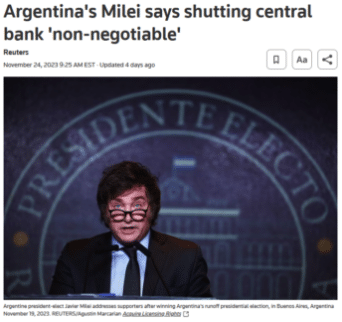
Reuters (11/24/23)
So the question is, in terms of policy, what does that mean? First, he wants to abolish the central bank, which of course would be a disaster, and almost no economist would support even thinking like that. And he wants to also dollarize the economy, which would probably also be a disaster; most economists would say that. They don’t even have the reserves for that at this point, but it wouldn’t be a good idea.
So he has big things he would get rid of. He would get rid of some ministries. And certainly the chainsaw, a symbol. A guy walks around in a Batman costume with chainsaws, and he got elected president. He wants to cut public spending at least 15%, has no attachment whatsoever to anything like public education, healthcare and everything. So he would cut anything he can, and the economy would probably go into recession, almost certainly. And who knows where it would stop.
JJ: He seems to have a definition of “socialism,” and this is what I feel like U.S. media are going to pick up on, because, as you and I both know, they will have a lot of quotes from him, and they will have quotes from some people who disagree with him, but I don’t think they’re going to dig deep into the rhetoric. And so he talks about everything that happened from previous administrations in Argentina as “socialism,” and, I mean, how do we unpack that?
MW: Yeah, that’s right. Argentina “has embraced socialist ideas for the last hundred years.” Of course, that’s crazy too.
I don’t know what he’ll actually be able to do. That’s the first thing. He has only 39 seats out of 257 in the Lower House, and 8 out of 72 in the Senate.
Now he does have a party aligned with him, that was the president from 2015 to ’19. And that was Macri. And that’s how he got elected, partly, because Macri and his party supported him; these are right-wing people, but they’re not as crazy as him.
So it’s not clear what he’ll get done. This is going to be what we’ll see.
You have to remember too that the government that he’s succeeding, the Peronists, they have a real movement, and they’ve gotten in the streets before when terrible things have happened; in 2001, four presidents resigned within less than two weeks, at the end of 2001. And that was because of protest.
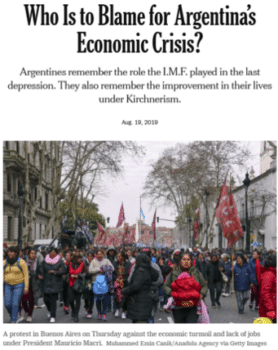
New York Times (8/19/19)
I think this is maybe where to start the story, because you guys focus on what the media are missing or getting wrong. And I think we really should start, I think, with what you don’t see in the media.
You don’t see, for example, that in these last 20 years, the Peronists actually did very well. They first came to power with Néstor Kirchner in 2003. And you had, in the 12 years that followed, before Macri, you had a 71% decline in poverty, 81% decline in extreme poverty, and GDP, or income per person, grew by 42%, which, I compared it to Mexico, it’s three times as fast.
So this was a very successful set of policies, but I haven’t seen that in any of the coverage. I wrote it in a New York Times op-ed a couple of years ago, but you don’t really see that part of the story.
And that’s unfortunate, because people need to know that. And of course it’s partly because people don’t know that—the Argentine media is no better than here, the major media—that somebody like this could get elected.
And, of course, what happened in this story, the other part of the story, I think, that’s really—well, first let’s start with the depression from 1998 to 2002. That was caused, overwhelmingly, by the IMF. And you can go back to the New York Times and read that, actually; at the time, they actually reported the IMF role.
So that was a huge part of the story. Because as you know, as most of your listeners know, the IMF is primarily dominated by decision-making by the U.S. Treasury Department.
And then, of course, you had the Kirchners and the Peronists, and you had this long period where they did very well. And Macri himself—that was the president from 2015 to ’19—he wouldn’t have gotten to power, actually, if it weren’t for more things that came from the United States. And I can tell you that as well, depending on how much time you have.
JJ: Please do; I think folks want to know where the U.S. role is here.
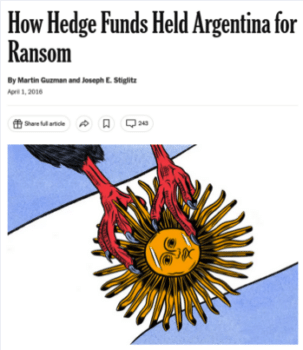
New York Times (4/1/16)
MW: Yeah, I think it’s really important, actually, for people here to know, because this was such a big thing. I mean, Argentina is obviously one of the largest economies in South America. And during this period, in the first decade of the 21st century, it wasn’t just Argentina that had this great rebound. Latin America as a whole reduced poverty from 44% to 28%, after having two decades of increasing poverty before that; that was 2003 to ’13, is the decade I’m looking at. That was a decade in which the majority of the hemisphere was governed by left governments for the first time ever.
And then the United States, of course, played this role, which we’ll focus right now on Argentina, in trying to get rid of all of them, and making their lives difficult so that they would be ousted, a number of them by coup d’etat.
So what happened in Argentina? They had to default to the IMF, in 2003, and the IMF backed down, and they defaulted on their private debt, right before they actually defaulted to the IMF, but the IMF rolled over the debt. So they had a big fight with the IMF and the private creditors, just to stabilize the economy. But they did that successfully, and they grew.
And then in 2014, a New York judge decided that Argentina should not be able to pay its creditors, over 70% of its creditors, the ones who had accepted the restructured debt. And this was Thomas Griesa, a New York judge, and he did this on behalf of the vulture funds. These were funds that bought up the debt when it was very cheap in the early 2000s, and wanted to collect the full value of it.

Mark Weisbrot: “The whole mess that got this guy elected was really created by the Macri government and that IMF agreement.”
So he was trying to force the Argentine government to pay these U.S. vulture funds. And he was doing it by cutting off the Argentines’ ability to pay all other creditors, until they would pay the vultures. And so that is part of what hurt the Argentina economy in 2014.
And just to show you how political this was, in 2016, the same judge, Griesa, actually wrote an opinion where he lifted the injunction on paying this debt, that is, he reversed the decision, and he said he did it because, and this is an exact quote from him, “Put simply. President Macri’s election changed everything.” OK?
So that’s partly how we got Macri, was him harming the Argentine economy right before that, and then, of course, reversing that tremendous harm as soon as Macri was elected. So there you go. There’s a big change. And it leads to another big change in Macri’s term because, OK, so Macri gets elected because of action that came from the U.S., and there are other actions as well, which I’ll describe.
But then Macri goes and gets—and this is because of Trump’s influence on the IMF that it happened—the largest loan that the IMF ever gave to anybody, any country in the world, $57 billion in 2018. And the conditions on that loan were terrible. And they forced the economy into recession. And then, of course, when things started to go sour—which they did right away, because the big loan that they got just financed capital flight out of the country, and, of course, that led to all kinds of problems—the IMF doubled down and had more austerity, both fiscal policy and monetary policy. And so things got worse.
And that actually leads you, really, to the situation you have today. That’s what created it: The economy, the 140% inflation that you have now, the whole mess that got this guy elected, was really created by the Macri government and that IMF agreement, and also other measures that the U.S. took to deprive Argentina of dollars before Macri came to power as well.
JJ: When you hear about having to make vulture funds whole, and the impact that has, I’m thinking Puerto Rico; I know that there’s lots of other places in the world that are coming to people’s mind. But then when you set that situation, so now I’m reading the Washington Post, which is trying to explain why did Milei get elected, and it’s saying:
Voters in this nation of 46 million demanded a drastic change from a government that has sent the peso tumbling, inflation skyrocketing and more than 40% of the population into poverty.
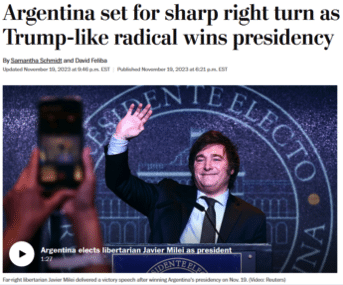
Washington Post (11/19/19)
So they’re saying, well, Milei’s against this, the poverty and the problems that they’re having; he’s coming before the people and saying, “I’m going to shake that up.” And I don’t think, at least in this explanation, I’m not getting anything of the longer term history that you’re giving me. I’m getting, things were bad, Milei’s there to fix them, right?
MW: Yeah. Although, I mean, I don’t think the media here like Milei. It’s just like Trump. It’s this irony that you have in a lot of these situations, where the media don’t like these people because they’re too extreme. The U.S. didn’t even want Bolsonaro, for example, in Brazil, who, by the way, was one of the first calls, a video call, that Milei made when he won this election. The mainstream consensus here is that these guys are too crazy, but they still do help them win.
JJ: Exactly….
MW: This is a paradox that probably you all can figure out better than me.
JJ: I can’t. But you know what, you see the interviews, and we’re seeing them now, and folks who are listening will be seeing them, folks on the street in Argentina saying: “Well, there’s just too much inflation. There’s too much corruption.” Very sort of Trump-voter things of, “Well, I don’t like his social ideas, but his economic plans make sense.”
People want change. And I think that we can acknowledge that people want change. And then folks come along and say, you know what I am? I’m different. I represent change.
But where media don’t, to my mind, exercise their role is, well, why do people want change? And what does that have to do with the failure of existing systems, including economic systems? Instead, media just say, “I guess people just deep down want a kind of fascistic guy.” Even if they’re opposed, they still don’t dig deep enough, to my mind, into why folks were willing to do this Hail Mary play.
MW: Yeah, and I think part of the media story is that most people in Argentina, as well as your audience, don’t know this historical record. I mean, imagine if all the voters knew that in the past 20 years, you had the majority of that time when the Peronists were in power, the numbers that I just told you; people did quite well in terms of reducing poverty enormously. And the real wage growth was 34% under the Kirchners, for example, over that period. And all these things happened, and increased spending on cash transfer programs, everything. And they did extremely well.
Some people remember it, and that’s why they still got 44% of the vote, but not everybody is old enough, or even would necessarily understand the whole situation, not having seen it in print, or heard it on radio or television.
And so, yeah, it’s easy for this guy to come in here, he’s almost literally a clown, and even though probably a lot of people, even, who voted for him think his ideas are crazy, or that he’s crazy, you see quotes like that in the press: “Yeah, he’s crazy, but I’m voting for him anyway.” But they don’t have a way of seeing that there actually have been successful alternatives.
And if we can go into the economics a little bit, I think part of the problem here is that the IMF loan is huge, and they have to pay that back. And of course they got some debt relief on the private debt, but the IMF doesn’t give any; they postponed the payment some, but it’s still going to come due. And, of course, you have capital flight because of that situation.
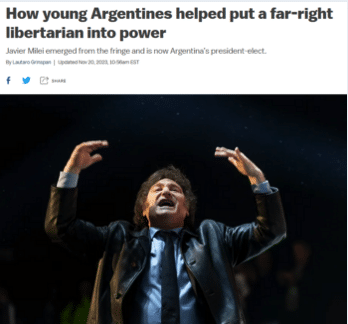
Vox (11/20/23)
And you have a situation where you have what’s called an inflation depreciation spiral. So if confidence in the currency is undermined by a variety of things, including the inflation itself, and including the debt problems that the IMF left them with, and then pretty soon it’s going to be the anticipated and real policies of the IMF that are going to cause capital to flee the country, as they did in 2018.
So all of these things: What happens is capital flees the country, and that causes the currency to depreciate. And when the currency depreciates, then the price of all imports goes up, and then that causes more inflation, and then the increased inflation causes the currency to depreciate more.
And that’s why it was so hard for this latest government before Milei to resolve this problem, because it’s a self-perpetuating spiral, something you don’t want to get into. And, of course, there are ways, it is possible, but again, that’s a very hard problem. And that was a result of the policies that came in overwhelmingly with the Macri government, and the IMF agreement that he followed.
And you know, he even said it at one point, I don’t have the exact quote, but it was something like, “I did everything that I agreed to in this agreement, and the economy went down the toilet.” So even he realized that.
But again, you’re not seeing that in the public discussion. All you saw up to the election is, the party in power must be responsible for what’s happening and they have to go. And then you see this guy Milei come in with really crazed ideas, and nobody even cares so much how crazy they are, it’s just different. That’s kind of how Trump won as well.
JJ: We’ve been speaking with Mark Weisbrot; he’s co-director of the Center for Economic and Policy Research. You can find their research and analysis online at CEPR.net. Mark Weisbrot, thank you very much for joining us this week on CounterSpin.
MW: Thank you.

